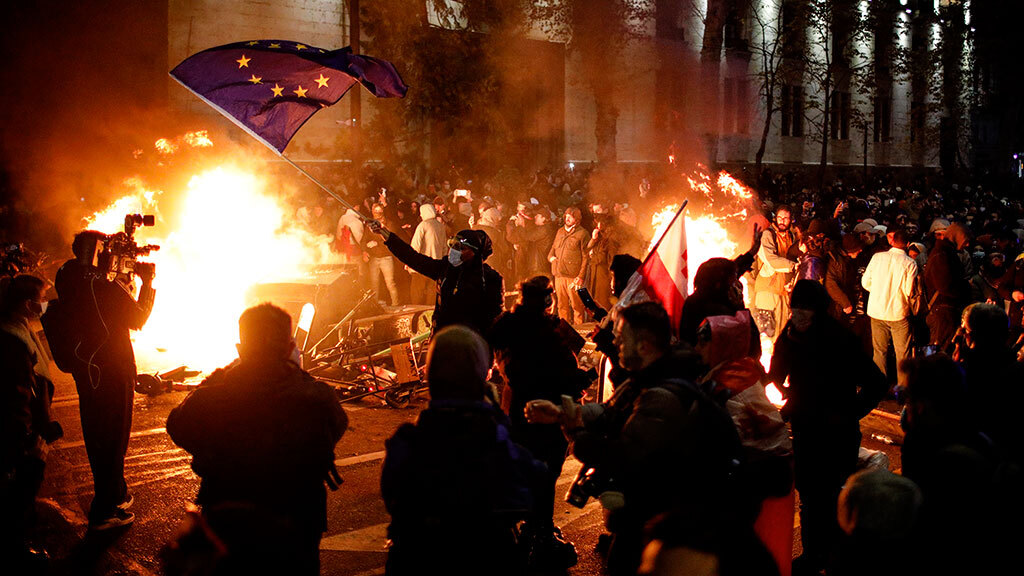Georgia after Municipal Elections: Protests and Political Crisis

On October 4, municipal elections were held in Georgia, which were supposed to confirm the political balance in the country. However, the vote immediately lost legitimacy in the eyes of a significant part of society: the largest opposition blocs – including parties united around Mikheil Saakashvili and other opposition leaders – announced a boycott. Their argument was simple: participation under the current conditions is meaningless, since the electoral process is controlled by the ruling Georgian Dream party.
On the same day, tens of thousands of people took to the streets of Tbilisi. The scale of the protest came as a surprise even to the authorities: not only opposition supporters but also apolitical citizens dissatisfied with rising prices, corruption, and the country’s foreign policy course joined the demonstrations. The slogan “Georgia is not Russia” once again became a symbolic marker – protesters see in the government’s actions tendencies toward authoritarianism and rapprochement with Moscow.
Events at the presidential palace escalated the situation. The crowd attempted to break into the building where government representatives were present. The police used water cannons and tear gas, which caused an even greater wave of indignation. Images of the crackdown quickly spread across international media, while human rights organizations denounced the excessive use of force.
For the ruling Georgian Dream party, the elections were of symbolic rather than municipal importance. Demonstrating control over the political system was meant to reaffirm its status as the “sole manager” of the country. However, the boycott and mass protests called this control into question. The government’s forceful response shows that instead of seeking dialogue with society, it has chosen the path of tightening repression.
Georgia has traditionally positioned itself as a country with a pro-Western course, striving for membership in the EU and NATO. However, in recent years Tbilisi has pursued a dual policy: on the one hand, a declarative commitment to the European vector; on the other, real steps toward deepening economic and political ties with Russia and Iran. This has caused concern in the West, and the current protests only reinforce the perception of Georgia as a country drifting toward authoritarianism.
If the protests continue, the authorities are likely to increase pressure, which could lead to new clashes and further radicalization of society. International partners, including the EU and the US, may demand negotiations with the opposition, linking them to financial and political support. A force-based scenario may temporarily suppress protests, but the cost of such suppression will be a further loss of trust domestically and a deterioration of the country’s image abroad.
 Latest news
Latest news Latest news
Latest newsKazakhstan to Fully Transition to Digital Governance: Tokayev Announces Creation of New Ministry
10.Oct.2025
State Duma Denounces Plutonium Disposal Agreement with the United States
09.Oct.2025
U.S. Congressmen Propose Sanctions Against Azerbaijan in Case of New Aggression Against Armenia
08.Oct.2025
Russia Intensifies Strikes on Ukraine’s Energy Sector: Major Thermal Power Plant Damaged
08.Oct.2025
Ukraine Receives €300 Million from the European Investment Bank for Winter Gas Purchases
07.Oct.2025
Canada Ready to Invest Up to $5 Billion in Armenia’s Mining Sector
07.Oct.2025
Municipal Elections in Georgia: Protests, Charges, and Growing Tensions with the EU
06.Oct.2025
Iran’s Parliament Approves Currency Redenomination to Remove Four Zeros from the Rial
06.Oct.2025
Trilateral Meeting of Azerbaijan, Russia, and Iran to Be Held in Baku
05.Oct.2025
Georgia after Municipal Elections: Protests and Political Crisis
04.Oct.2025

 14 Oct 2025
14 Oct 2025








